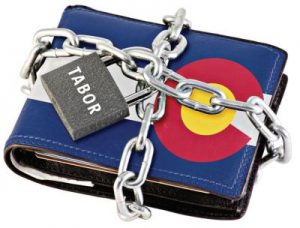Vote NO on this attack on your Colorado Taxpayer’s Bill of Rights
TABOR exemption question to be on fall ballot
Under House Bill 1257 and a companion measure, HB1258, all of the taxes and fees the state collects over the revenue cap under TABOR would be evenly divided between transportation, public schools and higher education.
TABOR limits growth in revenue collections year over year based on inflation and population growth.
“In the last 27 years since TABOR was voted into the Constitution, our state population has increased by 50 percent,” said House Speaker KC Becker, D-Boulder, who introduced the bill with Rep. Julie McCluskie, a Democrat whose district includes the eastern half of Delta County.
“More than 2.3 million more live in our state today than in 1992, and it’s projected between now and 2040 another 2 million people are estimated to move to our state,” Becker added. “That’s people moving to our state with a fixed gas tax, so we lose money on that every year, our roads are going to be even more crowded than they are today, our schools are going to be even older and more crowded than they are today. How are we going to adequately prepare for the future when we’re not even keeping up with the current demands of growth?”
House Republicans, who all voted against the bill, argued that while TABOR allows for such ballot questions, the Legislature shouldn’t ask for a blanket exception to its revenue cap provision. Instead, they should ask each year why that money should be retained.
“If we have that surplus and we have the ability to send tax refunds back to the taxpayers, under our Taxpayer’s Bill of Rights, we should absolutely get their consent to do it, explain specifically what we are doing that year, and not run a bill that takes away their consent for all future years,” said House Minority Leader Patrick Neville, R-Castle Rock.
Becker said TABOR refunds aren’t generated every year, and when they are they don’t amount to much per taxpayer.
Legislative budget forecasters, however, are predicting the state will exceed its TABOR caps by about $39.8 million this year and $64.8 million next year.
None of it, however, will be refunded to taxpayers, at least not directly. That’s because of a bipartisan bill approved in 2017 that directs the first TABOR refunds to counties to reimburse them for lost property tax revenues from the homestead exemption, which this year was about $150 million. That’s the tax credit that older Colorado homeowners receive for staying in their homes for more than a decade.
 Voters would be asked this fall if the state should be able to retain surplus revenue over what the Taxpayer’s Bill of Rights allows under a bill that won final approval in the Colorado House on Tuesday.
Voters would be asked this fall if the state should be able to retain surplus revenue over what the Taxpayer’s Bill of Rights allows under a bill that won final approval in the Colorado House on Tuesday.
Leave a Reply